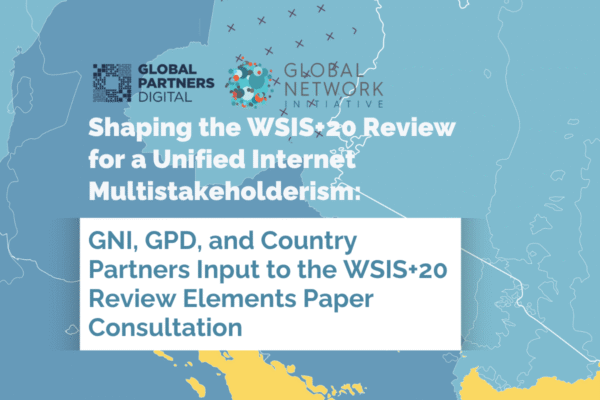
The Global Network Initiative (GNI), Global Partners Digital (GPD), and country partners from the Shaping the WSIS+20 Review for a Unified Internet Multistakeholderism project, supported by the inaugural ICANN Grant Program, participated in the World Summit for the Information Society (WSIS)+20 Review Elements Paper consultation, highlighting national and regional perspectives on the twenty-year review of the World Summit on the Information Society (WSIS). The consultation invited diverse stakeholders to help inform the Zero Draft for the UN General Assembly’s High-Level Meeting on December 16–17, 2025.
The submission draws directly from “The Road to WSIS+20: Key Country Perspectives in the Twenty-Year Review of the World Summit on the Information Society,” published in June 2025. The report offers valuable insights into the WSIS process and national-level priorities, bringing together research from Bangladesh, Brazil, Colombia, Chile, Ghana, India, South Africa, Tanzania, and Zambia. Partners include the Centre for Communications Governance at the National Law University, New Delhi, Data Privacy Brasil, Derechos Digitales, Digitally Right, Fundación Karisma, Media Foundation for West Africa, Paradigm Initiative, Research ICT Africa, and Collaboration for International ICT Policy for East and Southern Africa. In addition, the report also includes research chapters on China, the European Union (EU), Indonesia, the United Kingdom (UK), the United States (US), Russia, Saudi Arabia and Switzerland.
Key Insights and Recommendations Include:
-
Achievements of WSIS: The research highlights how WSIS has catalyzed national digital transformation efforts, promoted digital inclusion, strengthened digital public services, and amplified country-level digital agendas globally. Notable examples include Ghana’s Digital Ghana Agenda, Zambia’s infrastructure investments, and India’s push for digital public infrastructure.
-
Persistent and Emerging Challenges: The submission identifies obstacles to multistakeholder participation, concerns about meaningful connectivity, risks of digital repression, and gaps in Internet governance funding and implementation—especially for countries in the Global Majority. It also underscores the need for greater coordination between WSIS and the Global Digital Compact (GDC).
-
Future Priorities: To realize WSIS’s people-centered and inclusive vision, countries must prioritize ethical AI governance, gender equality, digital sovereignty, and sustainable development. Strengthening regional representation, meaningful stakeholder engagement, and human rights integration within digital policy frameworks are critical.
-
Recommendations for the WSIS Framework: Contributors call for a reinvigorated, rights-based WSIS Framework that bridges national, regional, and international efforts. The submission urges stronger support for national-level stakeholder engagement, equitable participation in global digital forums, and reaffirmation of the Internet Governance Forum (IGF) mandate.
This multistakeholder input reflects diverse national experiences and reaffirms the critical role of inclusive governance in shaping the future of the global digital ecosystem. The submission supports a future WSIS agenda that is development-oriented, rights-respecting, and genuinely multistakeholder.
About the Partners:
This submission is a product of collaboration between GNI, GPD, and local partners from the “Shaping the WSIS+20 Review for a Unified Internet Multistakeholderism” initiative. Participating organizations include the Centre for Communications Governance at the National Law University (India), Data Privacy Brasil, Derechos Digitales, Fundación Karisma, Media Foundation for West Africa, Paradigm Initiative, Research ICT Africa, and CIPESA, among others.